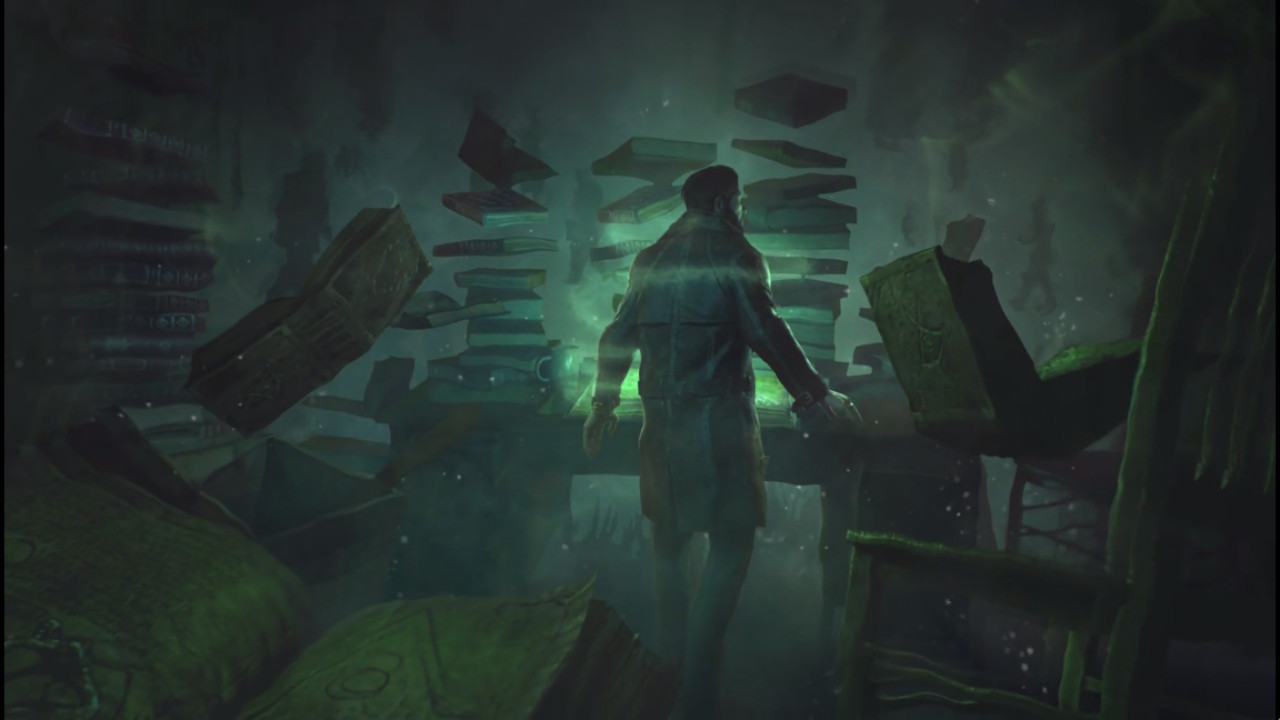I want to start this review by saying man, I love the Switch. Being able to slap on a good pair of headphones and holding the console up to my face while laying in bed in the dead of night is, in my opinion, the best way to experience horror games. It’s just that good.
“Call of Cthulhu: The Official Video Game” was developed by Cyanide Studios and published by Focus Home Interactive. It released last year on other platforms around late October but was released on Switch earlier in the month. The game is (obviously) an adaptation of the short story by famed horror writer H.P. Lovecraft but is actually primarily based on the 1980s tabletop game of the same name.
Now, that’s great and all but branding means nothing if the game isn’t good. Especially considering that Cthulhu and most of the works of H.P. Lovecraft are in the public domain. So really anyone can make a game based on Call of Cthulhu and plenty have. In fact, I originally started this review as a double review of this game and Frogware’s “The Sinking City” as said game was also recently ported to Switch and both games share extremely similar setups. But “Sinking City” is a long game so I decided to just stick to reviewing “Cthulhu” instead.

You play as Detective Edward Pierce who is sent out the island of Darkwater after being inquired about a case of a family that died in a fire that although was seemingly closed, things seemed amiss. Naturally, you find that the island is filled with all sorts of shady characters and get caught up in the many secrets and conspiracies said characters all have connections to. All the while you come across demons and other sorts of horrors and waking nightmares that toy with Edward’s sanity.
“Call of Cthulhu” does a pretty good job of standing out from its other horror contemporaries by uniquely blending several different genres and styles of gameplay. While the game is at its core a first-person horror game similar to “Amnesia: The Dark Descent” with the skill trees and dialogue options of something like “Fallout”, each of the game’s 14 chapters tends to play differently from each other. You’ll spend one chapter investigating a location and looking for clues while talking to Darkwater’s locals, another chapter will be spent sneaking past enemies trying to escape a location, then another can be action-oriented. I actually really enjoyed the constant shifting in playstyle from chapter-to-chapter as I often find that the lack of variety or change in pace in newer horror games causes me to lose interest after a while. These chapters are also fairly short, usually lasting somewhere between 20 and 40 minutes. Leaving the game to be overall 8 to 10 hours but feeling a lot faster.

But if the game is constantly changing its playstyle, then where does the RPG elements come in? And this is probably the most underwhelming aspect of the game as a whole. The game features a skill system where over the course of the game, you earn character points you put towards building certain aspects of Edward’s character. Building into certain skills opens up new abilities and dialogue options for your investigation. The game also features a sanity system that lowers depending on certain actions you choose throughout the game. You would hope that all these different character-building mechanics would lead to the game radically changing aspects of the game as you play but the game is actually incredibly linear. So really, all it results in is what flavor of ending you get at the ending of your playthrough. That’s not to say the game’s story and characters aren’t interesting enough to want to see all of the game’s many, many endings. But the idea of playing the same 8-10 hours again with some minor changes doesn’t sound too appealing.
Next, let’s discuss how the game is as a Switch port. The port was done by Saber Interactive who also ported CD Projekt Red’s “The Witcher 3” and Dontnod Entertainment’s “Vampyr” to the Switch, both of which also released this month. Damn. I guess Saber really has their work cut out for them. As far as third-party Switch ports go, it’s not gonna make any best-of lists. The game’s visuals are a bit murky due to a mixture of some low texture and model detail along with sub-native resolution in both docked and portable play. Luckily, said murky visuals suit the game’s style and overall look pretty well so it’s not distracting. Performance-wise, the game tends to chug during later sequences. But since the game isn’t primarily focused on combat or anything that would require fast reflexes, it’s not exactly hampering to the experience.

Overall, “Call of Cthulhu: The Official Video Game” is fine. Not great. Not bad. Just fine. I enjoyed the experience and the port is good, I just wish it had a bit more substance. Hopefully, the developers are perhaps working on some sort of sequel or follow-up that takes the gameplay and fleshes it out or widens the scope. But if you’re curious enough to walk the docks of Darkwater, I think you’ll still find yourself enjoying the madness by the end.
Score: 6/10
Special thanks to Evolve PR and Focus Home Entertainment for sending me a review code.
- Review: Famicom Detective Club – The Trilogy (Switch) - September 26, 2024
- Review: Dementium: The Ward – Remastered (Switch) – From DS to just S - October 11, 2023
- Fatal Frame: Maiden of Black Water (Switch) Review – Long Live Waggle - October 30, 2021








